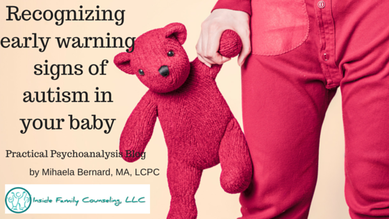 Article originally published in Practical Psychoanalysis Blog
Article originally published in Practical Psychoanalysis Blog If you do what most people do nowadays, you are probably frantically researching countless of websites, blog posts and articles to help you find some answers, which may have lead you to this post. Many parenting posts mention that each child is different and takes things at his/her own pace, leaving it open for interpretation if your baby is indeed delayed in their development. That can be even more confusing.
Warning sing #1: Your baby doesn't make good eye contact, doesn't smile or respond with giggles or sounds to you, and often seems to be in his/her own world. Eye contact and social smile are the first forms of communication in infants, which is one of the areas of functioning that autistic kids have a major difficulty in.
Warning sign #2: Your baby doesn't seem excited to play with you or other people by pointing at objects, giving them back to you and engaging in a reciprocal social interaction. For infants and toddlers, play is the main form of social interaction other than speech. Most autistic children struggle to play with others and prefer to engage with objects on their own.
Warning sing #3: Your baby doesn't respond when you call his/her name by 12 months. Most babies learn their name between five and seven months and would typically turn around and look at you when you call them.
Warning sign #4: Your baby does not say simple two-syllable words by 12 months like "ma-ma" and "da-da." Language delay impairment is characteristic of autistic spectrum disorder and it looks different, depending on the age of the child and where they are on the spectrum.
Warning sign #5: Your baby seems very sensitive to certain sounds, textures or clothes, making him/her more irritable, fussy, difficult to console. Sensory issues are common for children with autistic spectrum disorder and since babies cannot say what's bothering them, they may be extra fussy and difficult to console.
Warning sign #6: Your baby engages in repetitive and stereotypical behaviors such as rocking back and forth over and over again, head banging or hand flapping. Some of these behaviors happen from time to time during the first years of life and there's nothing to worry about. However, if this is a recurrent pattern for your baby and you are concerned about it, it's important to listen to your gut.
If your baby exhibits some or several of these warning signs between the ages of 6 and 24 months, don't be alarmed. Simply, consult with your pediatrician and request an evaluation - sometimes the symptoms of autism resemble other developmental difficulties and vice versa so it is important not to self-diagnose.
In general, the earliest that autism spectrum disorder is diagnosed, the sooner you can seek professional support and early intervention. Research has confirmed that early intervention is essential for the later success of people with autistic spectrum disorders.
Remember, just because your child may be different from others, it doesn't mean that they are "defective." In fact, many kids with autism spectrum disorder are very sensitive, smart or talented and if supported from an early age with proper interventions, can grow up to be productive members of society.
You may also like:
Parenting children with special needs: The 1 intervention you can't afford to neglect.
What does acting out mean and what can you do to help?
Attention deficit hyperactivity disorder: How to support your anxious child.
Depression in Adolescence: 5 Insights Every Parent Needs to Know



 RSS Feed
RSS Feed